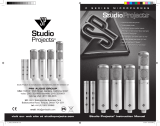
Product and Feature Descriptions
This large-diaphragm vacuum tube condenser microphone has been thoughtfully designed with feedback from sound engineers
working in recording studios for many years.
The microphone character was designed to offer a full and rich, low and mid-range, as well as smooth and unique high-mid and high
frequencies. Using premium quality and reliable components, this microphone will withstand use in a recording studio for many
years.
The electronic circuitry of the microphone exhibits less than 20dB of self-noise and a maximum SPL level of 120dB. The 31.25mm
diaphragms are made of an ultra-thin plastic material with a layer of gold on one side. The body helps prevent RF interference
allowing you to successfully use the microphone near transmitter stations and wireless microphones or other communications
equipment.
The Eden LT-386 features three switches on each side and back of the microphone just below the microphone grill. These switches
allow you to adjust the low-end; polar pattern and timbre (see Figures. 3, 4 and 5 below).
High-pass Switch
On the left side of the microphone we have our unique 2-stage, high-pass filter we call “Kick-shaper” and
“Vocal-shaper” (Figure 3). These filters are uniquely tuned to shape the low-end for two of the most
commons trouble areas when recording. In its default position there is no high-pass. Stage one, or the
middle position, is the “Kick-shaper”; this was designed for kick-drums. With its very step cut of the low-
end, it removes excess boominess that might actually take away from a big sounding kick. But feel free to
try it on toms, vocals, guitars etc. Moving the switch to stage 2, or the bottom position, is the “Vocal-
shaper” which is designed to clean up your vocal tracks for an amazingly smooth and classic sounding
vocal track. Of course, it will be useful for many more sources as well.
Polar Pattern Switch
The polar pattern switch (Figure 4). is located on the right side of the microphone. The selectable polar
patterns are figure-8 (top), cardioid (center), and omnidirectional (bottom). The ability to select different
polar patterns allows this microphone to be used in many recording situations. Having the pattern switch on
the microphone, allows you or the artist to quickly and easily make your selection.
Multi-voicing Switch
The Multi-voicing switch, located on the rear of the microphone, (Figure 5). makes Eden extremely diverse.
The options are F (Forward), N (Neutral) and G (Gentle). Multi-voicing is a process that can only be
achieved in the microphone itself. This is Lauten Audio’s proprietary technology that uses three separate
signal paths for unique frequency shaping. The multi-voicing functions in Eden are specifically designed
and tuned to bring out the best in Eden. The Gentle position provides maximum control of bright or peaky
sources or to achieve a very warm, vintage vibe. Throw in a high-pass filter and you’ll think you have a
completely different microphone. Neutral offers a nice even response with good control over S’s and starts
moving more toward a modern microphone but still wrapped in a vintage vibe. Lastly, Forward opens up
the microphone for that familiar “air” of classic microphones from the past with our own modern touch that
Lauten Audio is known for.
Figure. 3 High-pass filter
Figure. 4 Polar Pattern
Switch
Figure 5. Multi-voicing
switch
















